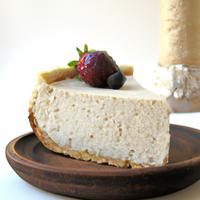
1 serving (150 grams) contains 350 calories, 5.0 grams of protein, 20.0 grams of fat, and 40.0 grams of carbohydrates.

Log this food in SnapCalorie

Nutrition Information
Calories |
552.1 | ||
|---|---|---|---|
% Daily Value* |
|||
| Total Fat | 31.5 g | 40% | |
| Saturated Fat | 7.9 g | 39% | |
| Polyunsaturated Fat | 0 g | ||
| Cholesterol | 0 mg | 0% | |
| Sodium | 315.5 mg | 13% | |
| Total Carbohydrates | 63.1 g | 22% | |
| Dietary Fiber | 4.7 g | 16% | |
| Sugars | 39.4 g | ||
| protein | 7.9 g | 15% | |
| Vitamin D | 0 mcg | 0% | |
| Calcium | 78.9 mg | 6% | |
| Iron | 2.4 mg | 13% | |
| Potassium | 236.6 mg | 5% | |
* Percent Daily Values are based on a 2,000 calorie diet. Your daily values may be higher or lower depending on your calorie needs.
Food Attributes
Source of Calories
About Vegan cheesecake
Vegan cheesecake is a plant-based twist on the classic dessert, offering all the creamy indulgence without any animal products. Typically, its filling is made using ingredients like cashews, coconut cream, silken tofu, or almond milk, blended for a rich and smooth texture. Sweeteners such as maple syrup or dates replace refined sugar, while the crust often features crushed nuts, oats, or dates. Originating from the growing vegan cuisine movement, this dessert caters to those seeking dairy-free or lactose-free options. Nutritionally, vegan cheesecake can contain healthy fats from nuts and coconut, along with fiber from whole food ingredients. However, like traditional cheesecake, it can be calorie-dense and high in fats depending on the recipe. Its appeal lies in being kinder to the planet while still satisfying sweet cravings with wholesome, plant-based ingredients.



